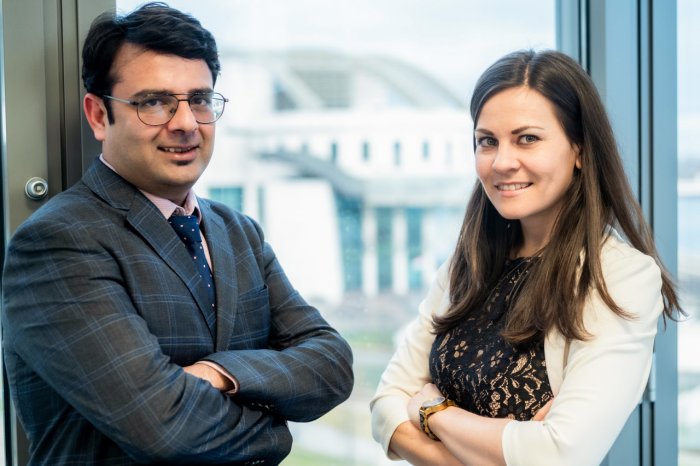Technology has made finance more creative and social than ever

Technology transformations such as AI modeling, process automation, and machine learning are reshaping the world of finance, and even more change is on the way. Morgan Stanley’s technology and analytical center in Budapest has embraced these shifts, and employees are championing innovations to advance finance in today’s digital world.
We recently met two financial modeling specialists at Morgan Stanley’s Budapest office to understand how these modernizations are changing the way they do finance.
Starting his career at a technology consultancy in his native India, with a background in electrical engineering, Shaunak Ohri never imagined that, one day, he would help to shape the future of finance at one of the world’s leading financial institutions in the Hungarian capital.

Shaunak Ohri
Yet, today, he is leading a financial planning and analysis (FP&A) team at Morgan Stanley’s Budapest office, which employs over 2,000 skilled professionals in its state-of-the-art offices on the Danube bank. His team is developing models which help the bank to analyze and quantify the impact of hypothetical macroeconomic scenarios on revenues. Reporting the results of these simulations has been an increasingly strict requirement from regulators in the past decade to ensure robust financial planning.
Shaping the future of finance
Ohri’s FP&A team, with its modeling and analytical expertise, is crucial to how Morgan Stanley fulfills a number of its regulatory requirements. The team partners with Viktoria Antal’s financial modeling team to help innovate and progress the firm’s financial strategy through technology and mathematical advances.
Antal originally joined Morgan Stanley in 2011, returning in 2015 after a nine-month sabbatical to travel overseas. With an Actuarial and Corporate Finance degree from Corvinus University of Budapest, Business and Economics studies in the United Kingdom, a Risk Management Certification (FRM), and an EMBA in progress at the Central European University, she has an extensive background in finance.

Viktória Antal
Yet in her current role with Morgan Stanley, Antal leverages key technical and coding skills learned in recent years. Like Ohri’s FP&A team, the financial modeling team does not only run the models but collaborates with others to constantly evaluate, re-think and improve them – whilst also developing the platforms they run on and exploring machine learning (ML) techniques for future innovation.
A melting pot of knowledge
Together these teams are a melting pot of professional expertise.
“Beyond finance, colleagues in my team have extensive and current macroeconomic knowledge and bring diverse experiences from a range of STEM fields. This knowledge is combined with advanced mathematical modeling expertise and the programming skills to develop the models”, said Antal. “We collaborate and combine our knowledge to test and apply new approaches, and if you’re a student interested in probability theory or coding, you’ll have a good chance of succeeding in the finance world of today.”
Ohri’s team even includes a music teacher who applied data science to study the structure of music. Bringing a unique perspective, he is able to apply his expertise in time-series data along with ML experience gained from a previous job in image processing. It’s hard to comprehend the extent of technology transformations that finance has experienced in recent years.
Consumer finance has been completely revolutionized by the rise of mobile banking, new payment methods and the importance of cybersecurity.
“In the last four years, we have learned a tremendous amount from collaborating with our technology teams here at Morgan Stanley”, explains Ohri. “We have applied their best tools and practices, such as ʼAgile and Leanʼ methodology, and adapted them for finance, where they were very new concepts. Machine learning was previously seen as a black box but today, we increasingly incorporate these models as they become ever more sophisticated.”
Automation highlights human insight
That being said, it would be a mistake to think that technology has made finance less human. In fact, it has done quite the opposite.
“When I first started at Morgan Stanley nine years ago, our daily work was heavily spreadsheet-based. Many of the manual tasks have now been automated; this automation has freed up our time to focus on much more interesting and creative tasks”, says Antal. AI models do not replace human insight – in fact, critical thinking is essential.
“You cannot rely purely on models”, warns Antal. “You may have a mathematically sound model, but it feeds on historical data. For example, if your portfolio or risk profile changes it can affect your models, and therefore will need to be monitored and updated. To do that, we need to apply our insight and expert judgments. It’s important that we also interact with our market risk management and internal audit teams to independently validate the models. Both divisions now have established teams here in Budapest.”
Global impact from Budapest
Previously Ohri was based in Morgan Stanley’s New York headquarters before relocating to Budapest. He admits he was a bit nervous about moving to Central Europe but the reservations quickly subsided. The firm helped him to relocate, find an apartment and settle into the city. Ohri is enjoying learning the language and his Hungarian colleagues in New York taught him some keywords and phrases before he relocated.
That said he is easily able to get by with English in Budapest.
“I feel we can make a real impact from Budapest. There are a lot of bright people here and we’re located in an ideal time zone. It overlaps the working hours between India and London, which is important as Morgan Stanley works 24/7. We often hand the baton from Hong Kong to India to Budapest London, right through to New York”, says the expert.
“Whilst, for example, we do not have trading desks here, we do add a lot of value to the firm in other ways”, notes Antal. “We work very closely with our investment banking colleagues, helping to develop the analytics and modeling functions they use on a daily basis. People here are driving real innovation for the firm. In normal circumstances, we also travel regularly, so we have a personal relationship with colleagues in other offices. More recently during the global pandemic, we have been connecting virtually, through video calls and conferences, to ensure global and cross-team collaboration. These solutions have enabled us to stay productive and connected as we have entirely shifted to remote working during the last couple of weeks.”
Inspiring the next generation
A key reason that Antal returned to Morgan Stanley is the firm’s international, open and collegiate culture. Diversity and inclusion at the firm is extremely important and there are several initiatives set to inspire the next generation. Antal volunteers in a number of programs designed to educate female high school students on the application of mathematics and coding in the workplace. She also champions engagement with her university, Corvinus University of Budapest, and coordinates colleagues from Morgan Stanley who can teach students the financial application of the VBA, SQL and Python programming languages. It’s clear to see that careers in finance have evolved and at Morgan Stanley they will continue to become more interesting and challenging than ever.
SUPPORT THE BUDAPEST BUSINESS JOURNAL
Producing journalism that is worthy of the name is a costly business. For 27 years, the publishers, editors and reporters of the Budapest Business Journal have striven to bring you business news that works, information that you can trust, that is factual, accurate and presented without fear or favor.
Newspaper organizations across the globe have struggled to find a business model that allows them to continue to excel, without compromising their ability to perform. Most recently, some have experimented with the idea of involving their most important stakeholders, their readers.
We would like to offer that same opportunity to our readers. We would like to invite you to help us deliver the quality business journalism you require. Hit our Support the BBJ button and you can choose the how much and how often you send us your contributions.








